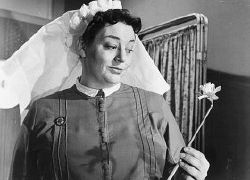 Today is Mothering Sunday, the day when we thank and honour the mother who has nurtured us. Dr No has been doing his filial duty – when it comes to Mothering Sunday even Dr No says ‘Yes’ – but thinking of nurturing set him thinking of the other nurturances and influences that have shaped the way he is. There are a number, but without doubt many cluster round his years as a medical student, when a young, volatile, opinionated, yet still malleable teenager was transformed at the anvil of apprenticeship into a brash and brittle junior Dr No, who walked the wards burning bright from the heat of the forge.
Today is Mothering Sunday, the day when we thank and honour the mother who has nurtured us. Dr No has been doing his filial duty – when it comes to Mothering Sunday even Dr No says ‘Yes’ – but thinking of nurturing set him thinking of the other nurturances and influences that have shaped the way he is. There are a number, but without doubt many cluster round his years as a medical student, when a young, volatile, opinionated, yet still malleable teenager was transformed at the anvil of apprenticeship into a brash and brittle junior Dr No, who walked the wards burning bright from the heat of the forge.
Thirty something years ago, medical schools were smaller, and each had its own character. Deans selected students not just by academic ability, but on a broader and rounder picture. And with the smallness came intimacy, not just amongst students, but also with our teachers and professors, many of whom had in their time been selected on broad round principles, and who had over the years matured in both broadness and roundness into characters of Olympian stature, Gods of Wrath and Goodwill that infused and flavoured the character of the school, and all those who belonged to the family that was the school. Even amongst rebellion and farce – and there was plenty of both – we still remained a family, bonded by the ties of the school.
When we qualified, as almost all did, we continued in the orbit of our school, often in housejobs at our teaching hospital, or at familiar hospitals tied to the school. The camaraderie of the student bar continued into the junior doctors mess; and the sisters and staff nurses we had flirted with and fled from in equal measure as students became our confidants and counsellors. We were accepted as part of the larger family that was the hospital; and even Matron knew our name.
The hours we worked were ruinously long, the work often menial. But the hours on the wards strengthened our sense of belonging. We were part of the family that was the hospital, and the hospital part of the wider family that was the NHS. And with that sense of belonging came one of nurturance, and of working for the wider common good under the coat-tails of a sometimes benevolent, sometimes cantankerous, sometimes downright malevolent but ever-present matriarchal NHS.
We are approaching a general election. Both major parties appear hell-bent on further destruction of the old – maternal and matronly – NHS. Financial accountability and efficiency are the new watchwords. What they forget in their accountancy headed ignorance is that there is lot more to making a health service work than money. The people – often called to work in the most testing of circumstances – need to believe they are part of a benevolent family. They need to feel nurtured – that an ultimately benevolent matriarchal NHS has their cause at heart – and that their Alma Mater is alive and well.
